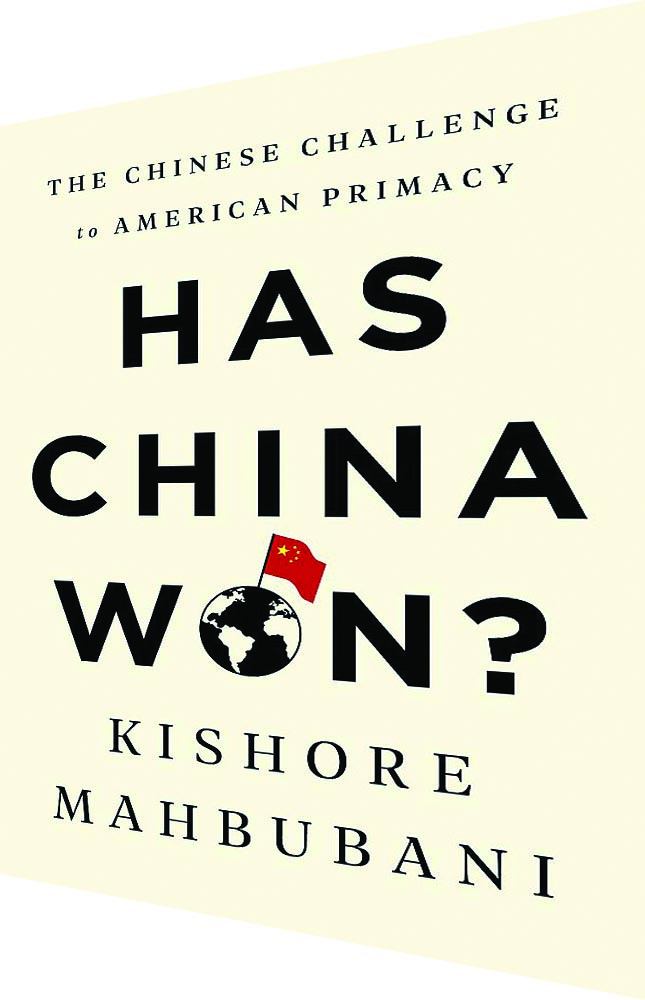 Has China Won?
Has China Won?
Kishore Mahbubani
Public Affairs
Rs.2,200 Pages 310
After the ignominious retreat of the last American soldier on Afghan soil on August 31 — a Taliban prescribed deadline — a new global geopolitical order with the world divided into two spheres of influence (SoI) of the democratic USA and the People’s Republic of China (PRC), is beginning to emerge. North and South America and Europe are the new SoI of the US. Asia and Africa are set to become the SoI of PRC, or more accurately of the 100 million-strong thoroughly indoctrinated and tightly controlled CPC (Communist Party of China).
An unsung but distinguished academic who foretold this global geopolitical rearrangement more than a year ago is Dr Kishore Mahbubani, founding dean of the Lew Kuan Yew School of Public Policy, Singapore, former Singapore ambassador to the United Nations and currently a distinguished fellow at the Asia Research Institute, the National University of Singapore.
Over the past few decades, especially during the presidency of Donald Trump (2016-20), a bipartisan consensus has emerged within the US establishment that communist China is the greatest threat to global peace. This is in sharp contrast to the MFN (most favoured nation) trade status that PRC enjoyed with the US until the mid-1990s.
In an insightful chapter titled ‘China’s Biggest Strategic Mistake,’ the author recounts the great enthusiasm with which America’s giant corporates including Boeing, General Motors, Microsoft among others, made huge investments in China. However, after these companies invested billions of dollars and established large manufacturing facilities, they began to be bullied to transfer technology, suffered procurement discrimination, experienced licensing difficulties and inadequate data security and protection of commercial secrets.
Simultaneously, the PRC leadership took advantage of WTO regulations to flood the US and Western countries with duty-free exports designed to help less developed countries. The upshot of this double-dealing is that when President Trump announced a trade war with China in 2016, “no one spoke up for China… not businesses, not China scholars, and certainly no one in Congress,” writes Mahbubani.
However if within the space of a decade, the US and China have transformed into hostile antagonists, the US is not faultless. In a balancing chapter titled ‘America’s Biggest Strategic Mistake,’ citing former American secretary of state Dr. Henry Kissinger and Indian-origin political commentator Fareed Zakaria, the author opines that the US establishment’s grave error was to have plunged into a global geo-political contest with China without first devising a long-term engagement strategy.
Mahbubani has no doubt that a new era defined by a Sino-American face-off for global power and influence, has dawned. Since the end of World War II, America has been the world’s premier super-power and engineer of the UN, IMF, World Bank and other institutions that underwrite the international order, and it has made its mission to spread democracy and rule of law worldwide. The US has “a powerful but invisible mental construct that has been deeply embedded in American minds: the assumption of virtue,” which has driven it to impose democracy, rule of law, and American value premises, on the not entirely willing world.
On the other hand, for all its professed communism, the real objective of President Xi Ping and CPC is to revive and glorify China’s Middle Kingdom, which for millennia until the 18th century was the richest and most powerful country in the world generating 25 percent of global GDP. Invaded and humiliated by the Mongols and several foreign powers including the Western nations in the 19th century, President Xi Ping and the CPC want 21st century China to assume its rightful historical position as the world’s dominant economic and military power which will never have to suffer the humiliation of foreign dictation.
To insulate itself against foreign incursions and domination and establish hegemony in its SoI, PRC has initiated its ambitious Belt & Road project to build highways, ports and energy plants, which when complete will traverse and connect it with 70 countries. In addition, it has emerged as the dominant nation in the Trans-Pacific Partnership (TPP) after President Trump pulled America out of this economic alliance.
The new China is the most populous and already second wealthiest country of the contemporary world with an annual GDP of $16 billion, second only to the US ($21 billion), and Dr Mahbubani is sympathetic to its aspiration to earn global respect because as he takes pains to highlight, China never has been an expansionist power eager to mould the world in its image.
Although there’s no guarantee that 21st century China is as disinterested as it was about establishing its footprint around the world, in this work of deep research and brilliant reasoning, Mahbubani provides a compelling vision of a stable new world order emerging after America’s debacle in Afghanistan and retreat into relative isolationism. It’s an indicator of disinterest in foreign affairs of Indian media and establishment that this excellent treatise hasn’t received traction in India, currently confronted with its own bilateral Chinese challenge in Aksai Chin and the northeast. We don’t seem to have learned any lessons from the lightning-fast rise of modern China into a global hegemon. A big price will have to be paid for this failure and neglect.
Dilip Thakore


























